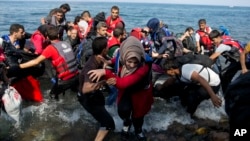Syrians and Libyans fleeing their war-torn countries and seeking to settle in Europe are exposing their children to atheism, drugs, alcohol and sexual permissiveness, Islamic State insurgents say.
And if the refugees have fled territory controlled by the militants, IS adds, they are committing a sin.
The judgments were contained in an article in the latest issue of the IS online magazine, Dabiq. Analysts said the magazine’s content and rulings are approved at the group's highest leadership levels.
“Sadly, some Syrians and Libyans are willing to risk the lives and souls of … their children, sacrificing many of them during the dangerous trip to the lands of the war-waging crusaders ruled by the laws of atheism and indecency,” the article warned.
The militants said those fleeing the caliphate in Syria and Iraq declared a year ago by the group’s leader, Abu Bakr al-Baghdadi, were sinful.
“It should be known that voluntarily leaving Dārul-Islām [land of Islam] for Dārul-kufr [land of unbelievers] is a dangerous, major sin, as it is a passage toward kufr [disbelief] and a gate toward one’s children and grandchildren abandoning Islam for Christianity, atheism or liberalism,” the article said.
It noted, however, that most families fleeing to Europe were coming from areas under the control of Syrian President Bashar al-Assad or from Kurdish areas.
Perilous for children
The article warned refugee parents migrating to Christian lands that they were exposing their children to “the constant threat of fornication, sodomy, drugs and alcohol.”
“If they don’t fall into sin, they will forget the language of the Quran — Arabic — which they were surrounded by in Syria, Iraq, Libya and elsewhere, making the return to the religion and its teachings more difficult,” it said.
The article cited various Muslim and jihadist scholars and said that according to some of them, “moving to Dārul-kufr from Dārul-Islām is apostasy, whereas others confirm that it borders apostasy.”
Shown with the article was a photo of the body of Kurdish 3-year-old Alan Kurdi, whose death drew worldwide attention to the plight of Syrian refugees. Kurdi, his brother and mother drowned after their boat capsized during the crossing from Turkey to Greece.
The family came from the Syrian Kurdish town of Kobani, which IS besieged for months, only to withdraw because of the defiance of Kurdish fighters and U.S.-led coalition airstrikes.
The use of the photo suggested to some observers that IS militants believe Syrians fleeing to Europe deserve the same fate as the Syrian boy.
Daveed Gartenstein-Ross, an analyst and author of the book “Bin Laden's Legacy,” said IS “comes as close to pure mustache-twirling evil as any group ever has” with such statements. He argued that IS helped to provoke the refugee crisis by terrorizing civilians.
“Criticizing the refugees at an awful time like this shows the group's true colors," he said. "It's not as though IS's true colors weren't known before, but the group takes an unusual degree of glee in displaying them.”
Clues to IS moves
Western intelligence officials and analysts read Dabiq closely for clues about possible IS moves. In the latest issue, the Islamic extremists focused on some of their constant themes, including the encouragement of sympathizers in the West and in countries supporting the U.S.-led coalition to mount "lone wolf" attacks.
The magazine said those who are unable to emigrate to Islamic State territory have a duty to wage jihad in their own lands, and it offered specific cities and organizations to target, noting there were more than 70 “crusader nations” to choose from:
“In addition to killing crusader citizens anywhere on the Earth, what, for example, prevents [an attacker] from targeting Rāfidī [heretic] communities in Dearborn (Michigan), Los Angeles and New York City? Or targeting Panamanian diplomatic missions in Jakarta, Doha and Dubai? Or targeting Japanese diplomatic missions in Bosnia-Herzegovina, Malaysia and Indonesia? Or targeting Saudi diplomats in Tirana [Albania], Sarajevo [Bosnia] and Pristina [Kosovo]?”
The Islamic extremists also suggested targeting Qatar, Kuwait and Saudi Arabia and focusing on the allies of the Kurdish groups fighting them in Syria and Iraq, including the International Kurdish Businessmen Union in Rotterdam, the Netherlands.
IS also claimed in the magazine that it was holding two new foreign hostages: Norwegian Ole Johan Grimsgaard-Ofstad, 48, and Chinese citizen Fan Jinghui, 50.
The magazine published photographs of the two wearing yellow jumpsuits as well as a telegraph number that anyone could use for a “limited time” to make ransom offers for either.




